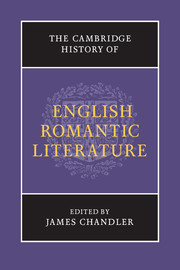Book contents
- Frontmatter
- Introduction
- Part I The Ends of Enlightenment
- Part II Geographies: The Scenes of Literary Life
- 5 London in the 1790s
- 6 Edinburgh and Lowland Scotland
- 7 Romantic Ireland: 1750–1845
- 8 France, Germany, America
- 9 The ‘warm south’
- 10 Country matters
- 11 Romanticism and the wider world: poetry, travel literature and empire
- 12 The homes of England
- 13 Writing, reading and the scenes of war
- 14 Regency London
- Part III Histories: Writing in the New Movements
- Part IV The Ends of Romanticism
- Chronology
- Bibliographies
- Index
- 1 A New Pocket Map of the Cities of London and Westminster; with the Borough of Southwark, Comprehending the new Buildings and other Alterations, 3rd edn (London: William Faden, 1790).">
- References
8 - France, Germany, America
from Part II - Geographies: The Scenes of Literary Life
Published online by Cambridge University Press: 28 May 2009
- Frontmatter
- Introduction
- Part I The Ends of Enlightenment
- Part II Geographies: The Scenes of Literary Life
- 5 London in the 1790s
- 6 Edinburgh and Lowland Scotland
- 7 Romantic Ireland: 1750–1845
- 8 France, Germany, America
- 9 The ‘warm south’
- 10 Country matters
- 11 Romanticism and the wider world: poetry, travel literature and empire
- 12 The homes of England
- 13 Writing, reading and the scenes of war
- 14 Regency London
- Part III Histories: Writing in the New Movements
- Part IV The Ends of Romanticism
- Chronology
- Bibliographies
- Index
- 1 A New Pocket Map of the Cities of London and Westminster; with the Borough of Southwark, Comprehending the new Buildings and other Alterations, 3rd edn (London: William Faden, 1790).">
- References
Summary
Describing the nation
Self-consciousness about being English can be traced very early in the national literature, although it is often hard to be sure whether the reference is to a political, racial, social or linguistic category, or to some unspoken measure of each. Chaucer’s Anglo-Norman literary language is very different from that of his equally English (and some say more English) contemporaries in the midlands and the north. Richard Helgerson has proposed that by the sixteenth century we can see in place a coherent national consciousness and a sense of occupying the heart of an empire among writers and intellectuals seeking to consolidate their interests within a professional and vocational elite. But the point at which such circumstances can be called a fully developed nationalism has been a topic of some debate among historians and political scientists. Benedict Anderson’s influential book restricts the term to nineteenth-century liberation or unification movements motivated primarily by an emergent bourgeoisie with the resources of print capitalism at their disposal, while Hans Kohn sees the origins of modern nationalism in the English seventeenth century, when Puritan England ‘regarded itself as the new Israel’. During the early eighteenth century, as Gerald Newman and Howard Weinbrot have shown in some detail, several varieties of self-ascribed Englishness came into prominence: the new Rome, the Protestant bastion, the abiding enemy of all things French.
Keywords
- Type
- Chapter
- Information
- The Cambridge History of English Romantic Literature , pp. 204 - 223Publisher: Cambridge University PressPrint publication year: 2009
References
- 1
- Cited by

